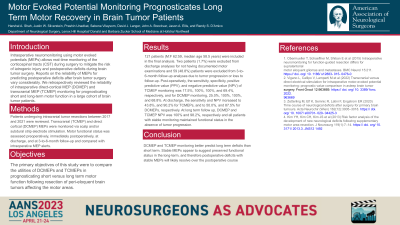Motor Evoked Potential Monitoring Prognosticates Long Term Motor Recovery in Brain Tumor Patients
Friday, April 21, 2023


Harshal A. Shah (he/him/his)
Medical Student
Donald and Barbara Zucker School of Medicine at Hofstra/Northwell
Boyds, Maryland, United States
ePoster Presenter(s)
Introduction: Intraoperative neuromonitoring using motor evoked potentials (MEPs) allows real-time monitoring of the corticospinal tracts (CST) to mitigate the risk of iatrogenic injury and postoperative deficits during brain tumor surgery. Reports on the reliability of MEPs for predicting postoperative deficits after brain tumor surgery vary considerably. We retrospectively reviewed the utility of intraoperative direct-cortical MEP (DCMEP) and transcranial MEP (TCMEP) monitoring for prognosticating short and long-term motor function in a large cohort of brain tumor patients.
Methods: Patients undergoing intracranial tumor resections between 2017 and 2021 were reviewed. Transcranial and direct cortical MEPs (TCMEPs, DCMEPs) were monitored via scalp and/or subdural strip electrode stimulation. Motor functional status was assessed preoperatively, immediately postoperatively, at discharge, and at 3-to-6-month follow-up and compared with intraoperative MEP alerts.
Results: 121 patients (M:F 62:59, median age 58.5 years) were included in the final analysis. Two patients (1.7%) were excluded from discharge analyses for not having documented motor examinations and 59 (48.8%) patients were excluded from 3-to-6-month follow-up analyses due to tumor progression or loss to follow-up. Post-operatively, the sensitivity, specificity, positive predictive value (PPV), and negative predictive value (NPV) of TCMEP monitoring was 17.5%, 100%, 100%, and 69.4%, respectively, and for DCMEP monitoring, 25.0%, 100%, 100%, and 68.8%. At discharge, the sensitivity and NPV increased to 43.8% and 90.2% for TCMEPs, and to 50.0%, and 87.5% for DCMEPs, respectively. At long term follow up, DCMEP and TCMEP NPV was 100% and 98.2%, respectively, and all patients with stable monitoring maintained functional status in the absence of tumor progression.
Conclusion : DCMEP and TCMEP monitoring better predict long term deficits than short term. Stable MEPs appear to suggest preserved functional status in the long-term, and therefore postoperative deficits with stable MEPs will likely resolve over the postoperative course.
Methods: Patients undergoing intracranial tumor resections between 2017 and 2021 were reviewed. Transcranial and direct cortical MEPs (TCMEPs, DCMEPs) were monitored via scalp and/or subdural strip electrode stimulation. Motor functional status was assessed preoperatively, immediately postoperatively, at discharge, and at 3-to-6-month follow-up and compared with intraoperative MEP alerts.
Results: 121 patients (M:F 62:59, median age 58.5 years) were included in the final analysis. Two patients (1.7%) were excluded from discharge analyses for not having documented motor examinations and 59 (48.8%) patients were excluded from 3-to-6-month follow-up analyses due to tumor progression or loss to follow-up. Post-operatively, the sensitivity, specificity, positive predictive value (PPV), and negative predictive value (NPV) of TCMEP monitoring was 17.5%, 100%, 100%, and 69.4%, respectively, and for DCMEP monitoring, 25.0%, 100%, 100%, and 68.8%. At discharge, the sensitivity and NPV increased to 43.8% and 90.2% for TCMEPs, and to 50.0%, and 87.5% for DCMEPs, respectively. At long term follow up, DCMEP and TCMEP NPV was 100% and 98.2%, respectively, and all patients with stable monitoring maintained functional status in the absence of tumor progression.
Conclusion : DCMEP and TCMEP monitoring better predict long term deficits than short term. Stable MEPs appear to suggest preserved functional status in the long-term, and therefore postoperative deficits with stable MEPs will likely resolve over the postoperative course.
